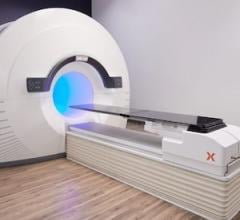
NIH Clinical Center
August 17, 2009 - Computed tomography (CT) and positron emission tomography (PET)/CT equipment purchased by the the NIH Clinical Center will now be required to routinely record radiation dose exposure in a patient's hospital-based electronic medical record, reported Radiology and Imaging Sciences at the National Institutes of Health Clinical Center.
"When a hospital or clinic patient receives a medication or a treatment, it is routinely recorded in the patient's medical record," said John I. Gallin, M.D., director of the Clinical Center, NIH's clinical research hospital in Bethesda, Md. "The Clinical Center's approach is an important first step in making it possible to more easily document and track information about a patient's exposure to radiation."
Today, electronic radiology information systems in hospitals generally do not collect or report radiation exposures. "CT and PET/ CT scanners do not currently forward data on radiation dose to our radiology information systems," said Dr. David A. Bluemke, M.D., Ph.D. Bluemke is director of Radiology and Imaging Sciences at the Clinical Center.
The risk of exposure to low doses of medical radiation from diagnostic medical-imaging tests isn't known, but very high radiation doses have the potential to cause cancer. The ability to keep track of an individual's exposure to radiation through routine imaging tests is needed so that researchers can begin to determine if these exposures pose a health risk.
"The National Council on Radiation Protection and Measurements reported recently that Americans received seven times more radiation exposure from medical tests in 2006 than was the case in the 1980s," said Ronald Neumann, M.D., chief of nuclear medicine and deputy associate director for imaging sciences at the Clinical Center. "CT and cardiac nuclear medicine studies accounted for much of this increased medical radiation exposure."
Ultimately, radiation dosage could become a standard element of a universal electronic medical record used to assess radiation risk from life-long medical testing, the Clinical Center radiologists said. "Recording radiation dose is technically possible and an ethical imperative, " Neumann said.
"The NIH Clinical Center also will require that newly purchased equipment allows patients to record their radiation dose exposure in their own personal health record," Bluemke added. Online resources to help individuals organize their health information as a personal medical record are becoming more prevalent. Currently, patients can easily receive their diagnostic imaging studies records on CD-ROM, Bluemke said. The NIH Clinical Center's imaging program will work with vendors who supply Clinical Center imaging equipment to develop software tools to extract the examination type, date, and radiation dose exposure from the CD-ROM, for uploading to a personal health record. As both the American College of Radiology and the Radiological Society of North America have recommended, patients should keep a record of their X-ray history.
About 25,000 CT and 1,250 PET/CT scans are performed at the Clinical Center each year as part of NIH research protocols. The clinical research hospital currently houses five CT scanners, and two PET/CT scanners.
The NIH Clinical Center (CC) is the clinical research hospital for the National Institutes of Health. Through clinical research, physician-investigators translate laboratory discoveries into better treatments, therapies and interventions to improve the nation's health.
For more information: www.nih.gov or clinicalcenter.nih.gov


 February 13, 2026
February 13, 2026 









